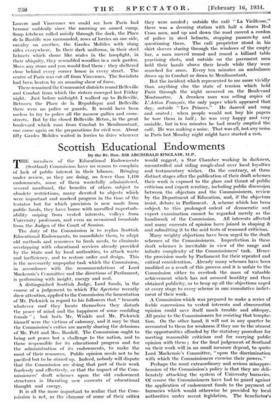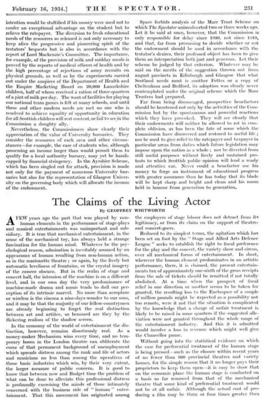Scottish Educational Endowments By the Rt. Hon. SIR ARCHIBALD SINCLAIR,
M.P.
THE members of the Educational Endowments (Scotland) Commission have no reason to complain of lack of public interest in their labours. Bringing under review, as they are doing, no fewer than 1,410 endowments, some of them wastefully administered, several moribund, the benefits of others subject to obsolete restrictions, many devoted to objects which were important and marked progress in the time of the testator but for which provision is, now made from public funds, they have borne with unruffled imperturb- ability sniping from vested interests, volleys from University professors, and even an occasional broadside from the Judges of the Court of Session.
The duty of the Commission is to replan Scottish Educational Endowments, to consolidate them, to adapt old methods and resources to fresh needs, to eliminate overlapping with educational services already provided by the State and by local authorities, to attack waste and inefficiency, and to restore order and design. This is the necessarily unpopular task which the Commission, in accordance with the recommendations of Lord Mackenzie's Committee and the directions of Parliament, is performing with insight, energy and zeal.
A distinguished Scottish Judge, Lord Sands, in the Course of a judgement to which The Spectator recently drew attention, applied to the Commission the lamentation of Mr. Pickwick in regard to his followers that "beneath whatever roof they locate themselves they disturb the peace of mind and the happiness of some confiding female " ; but both Mr. Winkle and Mr. Pickwick himself were the victims of calumny, and it may be that the Commission's critics are merely sharing the delusions Of Mr. Pott and Mrs. Barden. The Commission ought to bring not peace but a challenge to the nation, and to those responsible for its educational progress and for the administration of its endowments, to make the most of their resources. Public opinion needs not to be pacified but to be stirred up. Indeed, nobody will dispute that the Commission are doing that part of their work fearlessly and effectively, or that the impact of the Com- missioners' draft schemes upon the old endowment structures is liberating new currents of educational thought and energy.
It is all the more important to realize that the Corn- 'mission is not, as the clamour of- some of their critics would suggest, a Star Chamber working in darkness, uncontrolled and riding rough-shod over local loyalties and testamentary wishes. On the contrary, at three distinct stages after the publication of their draft schemes their work is exposed to the glare and thrust of public criticism and expert scrutiny, including public discussion between the objectors and the Commissioners, review by the Department of Education, and, if the objectors insist, debate in -Parliament. A scheme which has been subject to this prolonged ordeal of democratic and expert examination cannot be regarded merely as the handiwork of the Commission. All interests affected and many currents of opinion have joined in shaping it and submitting it to the acid tests of reasoned criticism.- Many weighty objections have been urged to the draft schemes of the Commissioners. -Imperfection in these draft schemes is inevitable in view of the range and infinite complexity of the Commissioners' task. Hence the provision made by- Parliament for their repeated and critical consideration. Already many schemes have been modified as a result of this process and it is unfair to the Commission either to overlook the mass of valuable achievement which has not aroused -hostility and thus obtained publicity, or to heap up all the objections urged at every stage to every scheme in one cumulative indict- ment of their work. .
A Commission which was prepared to make a series of feeble concessions to vested interests and obscurantist opinion could save itself much trouble and obloquy. All praise to the Commissioners for resisting that temptaL tion. On the other hand, it will not in any quarter be accounted to them for weakness if they use to the utmost the opportunities afforded by the statutory procedure for meeting reasonable criticism and for, carrying public opinion with them ; for the final judgement of Scotland on their work will in no small measure depend, to quote Lord Mackenzie's Committee, "upon the discrimination with which- the Commissioners exercise their powers." • Perhaps the most- extraordinary and serious misappre- hension of the Commission's policy is that they are deli- berately attacking the system of University bursaries. Of course the Commissioners have had to guard against the application of endowment funds to the payment of bursaries -which would 'otherwise. be provided by local authorities under recent -legislation, The benefactor's intention would be stultified if his money were used not to confer an exceptional advantage on the student but to relieve the ratepayer. The diversion to fresh educational needs of the resources so released is not only necessary to keep alive the progressive and pioneering spirit of the testators' bequests but is also in accordance with the report of Lord Mackenzie's Committee. The importance, for example, of the provision of milk and midday meals is proved by the reports of medical officers of health and by the high percentage of rejections of army recruits on physical grounds, as well as by the experiments carried out under the auspices of the Department of Health and the Empire Marketing Board on 20,000 Lanarkshire children, half of whom received a ration of three-quarters of a pint of milk per day. The want of facilities for playing our national team games is felt at many schools, and until these and other modern needs are met no one who is resolved to achieve equality of opportunity in education for all Scottish children will rest content, or fail to see in the Commission a doughty ally.- • Nevertheless, the Commissioners show clearly their appreciation of the value of University bursaries. They consider the resources of each area and other circum- stances—for example, the case of students who, although possessing an income larger than would permit them to qualify for a local authority bursary, may yet be handi- capped by financial stringency. In the Ayrshire Scheme, which has been singled out for attack, provision is made not only for the payment of numerous University bur- saries but also for the representation of Glasgow Univer- sity on the governing body which will allocate the income of the endowment. - Space forbids analysis of the Mari. Trust Scheme on which The Spectator animadverted two or three weeks ago. Let it be said at once, however, that the Commission is only responsible for delay since 1930, not since 1919, and that, far from presuming to decide whether or not the endowment should be used in accordance with the testator's desires, their professed object has been to give them an interpretation both just and generous. Let their scheme be judged by that criterion. Whatever may be said on the merits of the suggestion thrown out front august precincts in Edinburgh and Glasgow that what Scotland needs most is another Fettes or a copy of Cheltenham and Bedford, its adoption was clearly never contemplated under the original scheme which the Marr Trustees had prepared.
Far from being discouraged, prospective benefactors should be heartened not only by the activities of the Com- mission but by the spontaneous and powerful reactions which they have provoked. They will see clearly that their endowments will neither be allowed to rot in com- plete oblivion, as has been the fate of some which the Commission have discovered and restored to useful life ; nor be used to give relief to the ratepayer and taxpayer in particular areas from duties which future legislation may impose upon the nation as a whole ; nor be diverted front still useful purposes without lively and sustained pro- tests to which Scottish public opinion will lend a ready and attentive car. Never could a benefactor use his money to forge an instrument of educational progress with greater assurance than he has today that its blade will be kept sharp and bright and clean and his name held in honour from generation to generation.









































 Previous page
Previous page